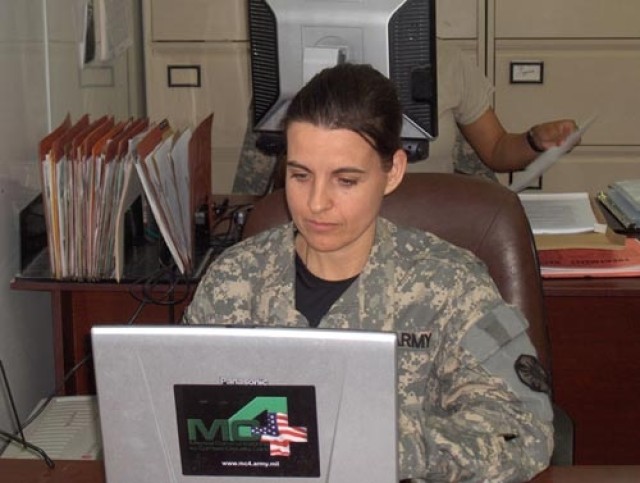WASHINGTON (Army News Service, May 28, 2008) -- Army Surgeon General Lt. Gen. Eric B. Schoomaker has announced continued expansion of medical information technology to support a comprehensive electronic health record for patients in combat zones.
Medical Communications for Combat Casualty Care, or MC4, provides digital recording capabilities and access to battlefield medical information via ruggedized laptops and handhelds intended to be used in combat zones to document patient care.
MC4 is now used at Army and Air Force medical facilities in Iraq and Afghanistan, in the Multinational Forces and Observers Effort in Sinai, Egypt, as well as by Army Special Forces, Navy and Marine providers throughout Southwest Asia. The system ensures that service members have an electronic, lifelong medical record.
More than 5 million electronic medical records have been captured since MC4's deployment in 2003.
"Everyone wants MC4 because of its universal benefits," said Lt. Col. Edward T. Clayson, commander of the Army's MC4 program. "Soldiers receive improved continuity of care, providers have up-to-date information to avoid repeat procedures and commanders have improved medical situational awareness to better place their medical resources and personnel on the battlefield."
When seconds count, the medical information of a wounded or ill service member can be beamed around the world to hospitals and doctor's offices straight from the battlefield in advance of their arrival.
Wounded Soldier Staff Sgt. Matthew Sims experienced the benefits of MC4 firsthand. "Having my medical records available electronically has helped doctors track and follow the treatment I have received at all of the different facilities," Sims said.
To date, the Army's MC4 program has deployed more than 24,000 systems to medical units in Iraq and 13 other countries, and trained more than 26,000 field medics, doctors, nurses and commanders on how to use the system in combat support hospitals and battalion aid stations.
Air Force doctor Lt. Col. John Mansfield, said he is a strong proponent of a joint medical record initiative. He said most military bases already have joint operability, so a single platform just makes sense.
"At Balad Air Force Base, 95 percent of the hospital staff is Air Force personnel, but most of the U.S. patients treated here are Army or Marine Corps," Mansfield said. "We don't care what uniform our patients wear, but it would drive us crazy if there were different systems to document care based on their service."
After the Gulf War, thousands of deployed service members returned from duty without proof of combat-related illnesses and injuries, resulting in loss of benefits. In 1997, presidential and congressional mandates chose to adjust course by calling for a medical tracking system and lifelong electronic medical record for all service members - MC4 is that solution, officials said.
"MC4 is the most comprehensive, proven information medical system on the battlefield," Lt. Col. Clayson said.
Clayson adds that MC4 provides service members with peace of mind that their deployed medical data is truly complete and available to them when they return home, aids in the receipt of healthcare benefits from the Veterans Administration and establishes a lifetime continuity of care.
More can be learned about the Army surgeon general's announcement at www.armymedicaltechnology.com. For more information about MC4, visit www.mc4.army.mil.


Social Sharing